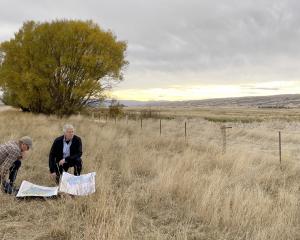Dunedin's residential property market looks set to end the year with a whimper rather than a bang, QV’s house price index says.
In the November quarter, home values declined 1.3%.
"With one month to go, the city’s negative rate of home value growth in 2022 stands in stark contrast to the 19.6% average growth it experienced throughout 2021," the report said.
The latest index showed values had dropped by an average of 11.5% in the 11 months to the end of November, from $725,853 to $642,286.
"The average home value had fallen by 1.2% since last month, while the number of listings on the market continues to increase," local QV-registered valuer Rebecca Johnston said.
"As a result, buyers feel like they can take their time in making purchase decisions.
"There remains very little demand for vacant land with the lag phase between land purchases and new builds starting to be realised, with a residential freestanding dwelling company closing within the last month."
Queenstown remained the exception as the country’s only main centre with a positive growth.
The home value growth in Queenstown was a relatively bullish 1% compared to a national average decline of 2.9%.
It marked a small decline from the 2.9% growth QV reported for the three months to the end of October.
With one month to go, Queenstown home values were 5.4% higher on average than they were at the start of the year, up $87,836 to $1,708,918.
In Invercargill, the residential property values continued their downward slide.
The November house price index showed the average home value had dropped 1.3% this quarter to $467,894.
With one month to go in the calendar year, that figure is 3.9% lower or $18,821 less than at the start of 2022.
"November marked Invercargill’s seventh drop within the last eight months," QV-registered valuer Andrew Ronald said.
"There was still much less demand now compared to late 2021 and early this year.
"This was particularly evident for entry-level housing where there are now limited investors and fewer first-home buyers looking to buy," he said.
Difficulties in obtaining suitable finance and rising interest rates and living costs were behind the drop.
The latest QV house price index showed homes decreased in value by 2.9% nationally over the three months to the end of November.
This was a slight improvement on the 3.9% quarterly reduction reported at the end of October with the average value now sitting at $945,568.
The report also stated the latest figures were in stark contrast to the same time last year, when the house price index showed values had climbed by an average of 25.5% from January to November 2021.
The closest comparable year was 2008, in the Global Financial Crisis (GFC), when home values fell by an average of 9% nationally from January to November, and 9.6% total during the calendar year.
"It’s been a crazy couple of years in real estate with massive growth followed by a pretty significant correction," QV chief operating officer David Nagel said.
"Rising interest rates combined with an increase in the cost of living are going to continue to make life tough for many of us, especially the highly leveraged and those who purchased at the peak of the market."
Of New Zealand's main urban centres, the largest home value drops so far in 2022 have been in Wellington (-18.7%), Palmerston North (-14.5%), Hastings (-12.5%), Auckland (-12.2%), Napier (-12%), Dunedin (-11.5%), Hamilton (-11.3%) and Tauranga (-9.3%).
At 5.4%, Queenstown was the only centre still showing positive home value growth for the year. Marlborough (-1.3%), New Plymouth (-2.2%) and Christchurch (-3.3%) were the next most resilient.
By: Staff reporter












